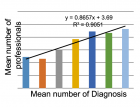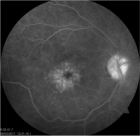Abstract
Research Article
Comparative Analysis of Water Wells and Tap Water: Case Study from Lebanon, Baalbeck Region
Chaden Moussa Haidar, Ali Awad, Walaa Diab, Farah Kanj, Hassan Younes, Ali Yaacoub, Marwa Rammal and Alaa Hamze
Published: 05 September, 2024 | Volume 8 - Issue 1 | Pages: 018-027
Water deficit is a fundamental factor in public health and economic growth. Water supply and population growth are directly linked to water demand. The physio-chemistry and microbiology analysis of water is utmost significance in dietary requirements. Drinking water has the main concern especially it affects food security. This study includes a number of representative sites where 24 water samples (from wells, reservoirs and tap water) were analysed. These sites are located in the western villages of Baalbeck, the main city of the Bekaa Plain in Lebanon where the analysed water is used mainly for domestic needs and for irrigation. This study investigates the physiochemical and microbiological properties. Among the selected sites, Hawsh Barada site shows a strong contamination by nitrate. At the Nabi Rashaded (tap), Beit Shema and Bednayel (borehole and tap), contamination above the norm by zinc ion was noted. From a microbiological point of view, Hawsh barada, Nabi-Rashadeh, Hawsh-bay, and Beit shema are markedly polluted and do not meet the standard for drinking water. Hence, water quality in Hawsh barada, Nabi-Rashadeh, Hawsh-bay, Beit shema and Bednayel are not suitable for drinking, and this must be informed to decision makers who can act implementing environmental controls for health protection in the studied region.
Read Full Article HTML DOI: 10.29328/journal.ivs.1001043 Cite this Article Read Full Article PDF
Keywords:
Boreholes; Potable water; Bacteriological analysis; Water-related diseases
References
- Postel SL, Daily GC, Ehrlich PR. Human appropriation of renewable fresh water. Science. 2008;271(5250):785-788. Available from: http://www.jstor.org/stable/2889886
- Saab HB, Nassif N, El Samrani AG, Daoud R, Medawar S, Ouaïni N. Suivi de la qualité bactériologique des eaux de surface (rivière Nahr Ibrahim, Liban). Rev Sci Eau. 2008;20(4):341-352. Available from: https://doi.org/10.7202/016909ar
- Awad S. Hydrochimie et faciès géochimiques des eaux souterraines, Plaine de Bekaa. Hydrol Sci J. 2011;56(2):334-348. Available from: http://dx.doi.org/10.1080/02626667.2011.559331
- Kassem Y, Gökçekuş H, Aljamal J. Surface water resource and effect of weather parameters in estimating the annual rainfall: a case study in Lebanon. IOP Conf Ser Mater Sci Eng. 2020;800(1). Available from: https://iopscience.iop.org/article/10.1088/1757-899X/800/1/012028
- Bengarnia Benmerine. Contribution to the study and evaluation of the physical-chimique and bacterial quality of the consumption products of the Oued Es-Saoura region. 2020.
- Nehme N, Mousa Haidar C, Dib A, Azouj N, Tarawneh K. Quality assessment of groundwater in the lower Litani Basin (LLRB), Lebanon. Geosciences Research. 2020;5(1). Available from: http://dx.doi.org/10.22606/gr.2020.51001
- Haidar C. Evaluation of the quality of the water of the lower bassinet of the river du Litani, Liban: environmental approach [Internet]. 2018. Available from: HAL Id: tel-01751390
- Nehme N, Mousa Haidar C, Rammal M, Abou Abbas F, Rammal H, Azouj N. Study of the water assessment in the Alhoujair Valley in Lebanon. J Mater Sci. 2021;12(11):1392-1404. ISSN: 2028-2508. Available from: https://www.jmaterenvironsci.com/Document/vol12/vol12_N11/JMES-2021-12112-Nehme.pdf
- Diab W, Haidar CM, Farhat M, Rammal M, Awad A, Hamzeh A. Drinking-water quality assessment in selective schools from Mount Lebanon. Ann Civil Environ Eng. 2024;7(8). Available from: https://doi.org/10.29328/journal.acee.1001061
- Nehme N, Mousa Haidar C, AL-Jarf Z, Abou Abbas F, Moussa N, Youness G, Tarawneh K. Assessment of the physicochemical and microbiological water quality of Al-Zahrani River Basin, Lebanon. Jordan J Earth Environ Sci. 2021;12(3):206-213. Available from: https://hal.science/hal-03295552
- Nehme N, Haydar C, Koubaissy B, Fakih M, Awad S, Toufaily J, Villieras F, Hamieh T. Metal concentrations in river water and bed sediments of the Lower Litani River Basin, Lebanon. J Adv Chem. 2014;8(2):1590-1601. Available from: http://dx.doi.org/10.24297/jac.v8i2.4040
- MDH M. Physico-chemical, bacterial and impact characteristics on surface eaux and souterraines, BAMAKO-Mali [Internet]. 2005;1-135. Available from: https://www.scirp.org/reference/referencespapers?referenceid=2517539
- World Health Organization. Guidelines for drinking-water quality. 4th ed. Geneva: World Health Organization; 2017. Available from: https://www.who.int/publications/i/item/9789241549950
- Nehme N, Haidar C. The physical, chemical, and microbial characteristics of Litani River water. In: The Litani River Lebanon: an assessment and current challenges. Water Science and Technology Library. Springer; 2018;57. Available from: http://dx.doi.org/10.1007/978-3-319-76300-2_4
- Ambroise B. The dynamique of the cycle of the water in a versatile bass: processus, facteurs, modèles. Bucharest, Romania: Editions HGA; 1999;206. Available from: https://search.worldcat.org/title/dynamique-du-cycle-de-leau-dans-un-bassin-versant-processus-facteurs-modeles/oclc/490958974?referer=di&ht=edition
- Metahri S. Simultaneous elimination of air pollution and phosphaté from the eaux used treated by the proper procedures. 2012;172. Available from: https://dspace.ummto.dz/items/7c17bbda-cf82-495f-a4a0-8d481dc7b5b1
- Laigle D, Kugler J, Kobus H, Zilliox L. Contamination des eaux souterraines par les nitrates: recherches et applications dans le cadre de la coopération franco-allemande. Hydrogeologie. 1990;1:51-160. Available from: https://core.ac.uk/download/pdf/147554441.pdf
- Ayad W, Kahoul M. Evaluation of the physico-chimique and bactériologique quality of the southern waters: case of the puits of the El-Harrouch region (Wilaya de Skikda). J Mater Environ Sci. 2016;7:1288-1297. Available from: https://www.jmaterenvironsci.com/Document/vol7/vol7_N4/143-JMES-2017-Ayad.pdf
- Viennot P. La pollution du bassin de la Seine par les nitrates [Internet]. 2009. Available from: eau-seine-normandie.fr
- Akil A, Hassan T, El Hamichi FP, Lahcen B, Abderrahim L. Study of the physical-chemical quality and metal contamination of the surface eaux of the bassin versant de Guigou, Maroc. Eur Sci J. 2014;10(23):1857-1881. Available from: https://core.ac.uk/download/pdf/236415782.pdf
- Soncy K, Djeri B, Anani K, Eklou-Lawson M, Adjrah Y, Karou D, et al. Evaluation of the bacterial quality of eaux de puits et de forage in Lomé, Togo. J Appl Biosci. 2015;91(1):8464. Available from: http://dx.doi.org/10.4314/jab.v91i1.6
- Ramírez E, Rios JF, Calderón JA, Echeverría F, Peñuela G. Alteration of the drinking water quality by different metallic materials used in distribution systems. Corros Prot. 2009;1(4):1443-1450. Available from: https://citeseerx.ist.psu.edu/document?repid=rep1&type=pdf&doi=05ebed9fd90d42dc09b61a137c03d1a589769443
- Nehme N, Haidar CM, Diab W, Tarawneh K, Villieras F. Assessment of heavy metal pollution in the sediments of the Lower Litani River Basin, Lebanon. Jordan J Earth Environ Sci. 2019;10(2):104-112. Available from: https://www.researchgate.net/publication/335820473_Assessment_of_Heavy_Metal_Pollution_in_the_Sediments_of_the_Lower_Litani_River_Basin_Lebanon
- MEDSTAT-Environnement RL. Compendium statistique national sur les statistiques de l’environnement au Liban 2006. Administration Centrale de la Statistique [Internet]. 2006;(2):1-38. Available from: http://www.cas.gov.lb/images/PDFs/enviromment.pdf
- Eau P-CDEL, La CASDE. Contribution to the evaluation of the physical and chemical quality of the water: case of the urban river Gombe de Kinshasa/République Démocratique du Congo. 2016;26:7-29. Available from: https://openurl.ebsco.com/EPDB%3Agcd%3A15%3A14063503/detailv2?sid=ebsco%3Aplink%3Ascholar&id=ebsco%3Agcd%3A116581987&crl=c
- Amir B, Omar B, Yasmina M. Elimination of industrial pollutants by adsorption on carbon dioxide and photocatalytic degradation on TiO2. J Mater Environ. 2011;2011. Available from: https://dspace.univ-ouargla.dz/jspui/handle/123456789/8788
- L’eau potable en France, 2002-2004. Guide Tech Eau Santé [Internet]. 2005;53. Available from: https://sante.gouv.fr/
- Ohno T. Fluorescence inner-filtering correction for determining the humification index of dissolved organic matter. Environ Sci Technol. 2002;36(4):742-746. Available from: https://doi.org/10.1021/es0155276
- Banas D, Lata JC. Les phosphates. Le livre blanc des polluants de l’habitat [Internet]. 2006;121(2).
- Chery L, Barbier J. Le phosphore dans les eaux souterraines en France. État des connaissances. Année 1. 2000;2000:63. Available from: https://infoterre.brgm.fr/rapports/RR-40857-FR.pdf
- Akil A, Hassan T, El Hamichi FP, Lahcen B, Abderrahim L. Study of the physical-chemical quality and metal contamination of the surface eaux of the bassin versant de Guigou, Maroc. Eur Sci J. 2014;10(23):1857-1881. Available from: https://oa.mg/work/1902432142
- Garcia J, Roger P. Le cycle du soufre. 2000;1-29.
- National Agency for Food, Environmental and Occupational Health Safety (ANSES). Sheet 9: Assessment of health risks linked to exceeding the quality reference for sulfates in water intended for human consumption. Analytical uncertainty 4- 2005;108-35.
- Lamprey-Maldonado DK. Characterization and origin of métaux traces, aromatic hydrocarbons, polycyclics and pesticides transported by the atmospheric retombées and ruisellement eaux in the bassins versatile separatifs péri-urbains [Internet]. 2009;297. Available from: https://theses.hal.science/tel-00596847
- Salvarredy Aranguren MM. Contamination in métaux lourds des surface eaux et des sediments du Val de Milluni (Bolivian Andes) par dechets miniers: approches géochimique, minéralogique et hydrochimique. 2008;489. Available from: https://theses.hal.science/tel-00277431
- Serpaud B, Casteignau M, Matejka G. Adsorption des métaux lourds (Cu, Zn, Cd et Pb) par les sédiments superficiels d’un cours d’eau: rôle du pH, de la température et de la composition du sédiment. Revue des sciences de l’eau. 1994;7(4). Available from: https://www.erudit.org/fr/revues/rseau/1994-v7-n4-rseau3277/705205ar.pdf
- Ombeni J, Munyuli TM, Lwango A, Mwangi T, Nabintu F, Izuba E, et al. Bacteriological quality of street foods vended in Bukavu City: potential health risks to consumers. Bact Emp. 2018;1(1):13-21. Available from: https://office.scicell.org/index.php/BE/article/view/12
- Escherichia coli dans l'eau potable. 2019. Available from: https://www.canada.ca/content/dam/hc-sc/documents/programs/consultation-e-coli-drinking-water/document/e-coli-consultation-FRA-June-10-2019.pdf
- Anonyme 3. Les faits en eau potable: bactéries coliformes, coliformes totaux et E. coli. 2017;4. Available from: https://www2.gnb.ca/content/dam/gnb/Departments/h-s/pdf/fr/MilieuxSains/eau/Coliformf.pdf
- Santé Canada. Recommandations pour la qualité de l’eau potable au Canada: document technique - cadmium [Internet]. 1986. Available from: https://www.canada.ca/fr/sante-canada/services/publications/vie-saine/recommandations-pour-qualite-eau-potable-canada-document-technique-cadmium.html#s5_2
- Côté C. Risk of microbiological contamination of soil waters and preventive measures for adopter. 2004.
- Gauthier MF. Biofilms and biological quality of drinking water. Thèse. 2002.
- R-N. Modélisation de la corrosion des conduites d’eau potable en fonte de la ville de Québec. 2012.
- Bensaada S. Corrosion courses. 2017;79. Available from: https://www.univ-biskra.dz/enseignant/bensaada/corrosion.pdf
- Wang W, Du C, Chen N, Chen Z, He X. Spatial distribution, sources identification, and risk of the trace metals in surface sediments of Chaohu Lake using multivariate statistics and geostatistics. Nat Environ Pollut Technol. 2017;16(2):339-350. Available from: https://neptjournal.com/upload-images/NL-60-3-(1)D-605com.pdf
- Rubio B, Nombela MA, Vilas F. Geochemistry of major and trace elements in sediments of the Ria de Vigo (NW Spain): an assessment of metal pollution. Mar Pollut Bull. 2000;40(11):968-980. http://dx.doi.org/10.1016/S0025-326X(00)00039-4
Figures:
Similar Articles
Recently Viewed
-
Knowledge, Attitude, and Practices of Parents toward (Infant & Child) Oral Health in Family Medicine Center at PSMMC, RiyadhMaryam Alanazi*, Wed Alanazi, Hanan Alali, Fatma Alnoaimi, Arwa Shuwaykan, Nuha Al-Yahya. Knowledge, Attitude, and Practices of Parents toward (Infant & Child) Oral Health in Family Medicine Center at PSMMC, Riyadh. J Oral Health Craniofac Sci. 2023: doi: 10.29328/journal.johcs.1001044; 8: 016-023
-
Success, Survival and Prognostic Factors in Implant Prosthesis: Experimental StudyEpifania Ettore*, Pietrantonio Maria, Christian Nunziata, Ausiello Pietro. Success, Survival and Prognostic Factors in Implant Prosthesis: Experimental Study. J Oral Health Craniofac Sci. 2023: doi: 10.29328/journal.johcs.1001045; 8: 024-028
-
A Resurgence of the Idea of Hypertriglyceridemia and Lower Serum (HDL-C) as Predictive Factors for Insulin Resistance (IR) & Type 2 Diabetes Mellitus Development: A Narrative ReviewKulvinder Kochar Kaur*. A Resurgence of the Idea of Hypertriglyceridemia and Lower Serum (HDL-C) as Predictive Factors for Insulin Resistance (IR) & Type 2 Diabetes Mellitus Development: A Narrative Review. New Insights Obes Gene Beyond. 2025: doi: 10.29328/journal.niogb.1001022; 9: 001-012
-
Novel Mutation in Famous Gene Diseases in Red Blood CellsMahdi Nowroozi*. Novel Mutation in Famous Gene Diseases in Red Blood Cells. New Insights Obes Gene Beyond. 2025: doi: 10.29328/journal.niogb.1001023; 9: 013-020
-
Treatment Outcome in Patients with Myofascial Orofacial Pain: A Randomized Clinical TrialAnders Wänman*, Susanna Marklund, Negin Yekkalam. Treatment Outcome in Patients with Myofascial Orofacial Pain: A Randomized Clinical Trial. J Oral Health Craniofac Sci. 2024: doi: 10.29328/journal.johcs.1001046; 9: 001-008
Most Viewed
-
Effects of dietary supplementation on progression to type 2 diabetes in subjects with prediabetes: a single center randomized double-blind placebo-controlled trialSathit Niramitmahapanya*,Preeyapat Chattieng,Tiersidh Nasomphan,Korbtham Sathirakul. Effects of dietary supplementation on progression to type 2 diabetes in subjects with prediabetes: a single center randomized double-blind placebo-controlled trial. Ann Clin Endocrinol Metabol. 2023 doi: 10.29328/journal.acem.1001026; 7: 00-007
-
Physical Performance in the Overweight/Obesity Children Evaluation and RehabilitationCristina Popescu, Mircea-Sebastian Șerbănescu, Gigi Calin*, Magdalena Rodica Trăistaru. Physical Performance in the Overweight/Obesity Children Evaluation and Rehabilitation. Ann Clin Endocrinol Metabol. 2024 doi: 10.29328/journal.acem.1001030; 8: 004-012
-
Hypercalcaemic Crisis Associated with Hyperthyroidism: A Rare and Challenging PresentationKarthik Baburaj*, Priya Thottiyil Nair, Abeed Hussain, Vimal MV. Hypercalcaemic Crisis Associated with Hyperthyroidism: A Rare and Challenging Presentation. Ann Clin Endocrinol Metabol. 2024 doi: 10.29328/journal.acem.1001029; 8: 001-003
-
Exceptional cancer responders: A zone-to-goDaniel Gandia,Cecilia Suárez*. Exceptional cancer responders: A zone-to-go. Arch Cancer Sci Ther. 2023 doi: 10.29328/journal.acst.1001033; 7: 001-002
-
The benefits of biochemical bone markersSek Aksaranugraha*. The benefits of biochemical bone markers. Int J Bone Marrow Res. 2020 doi: 10.29328/journal.ijbmr.1001013; 3: 027-031

If you are already a member of our network and need to keep track of any developments regarding a question you have already submitted, click "take me to my Query."

















































































































































